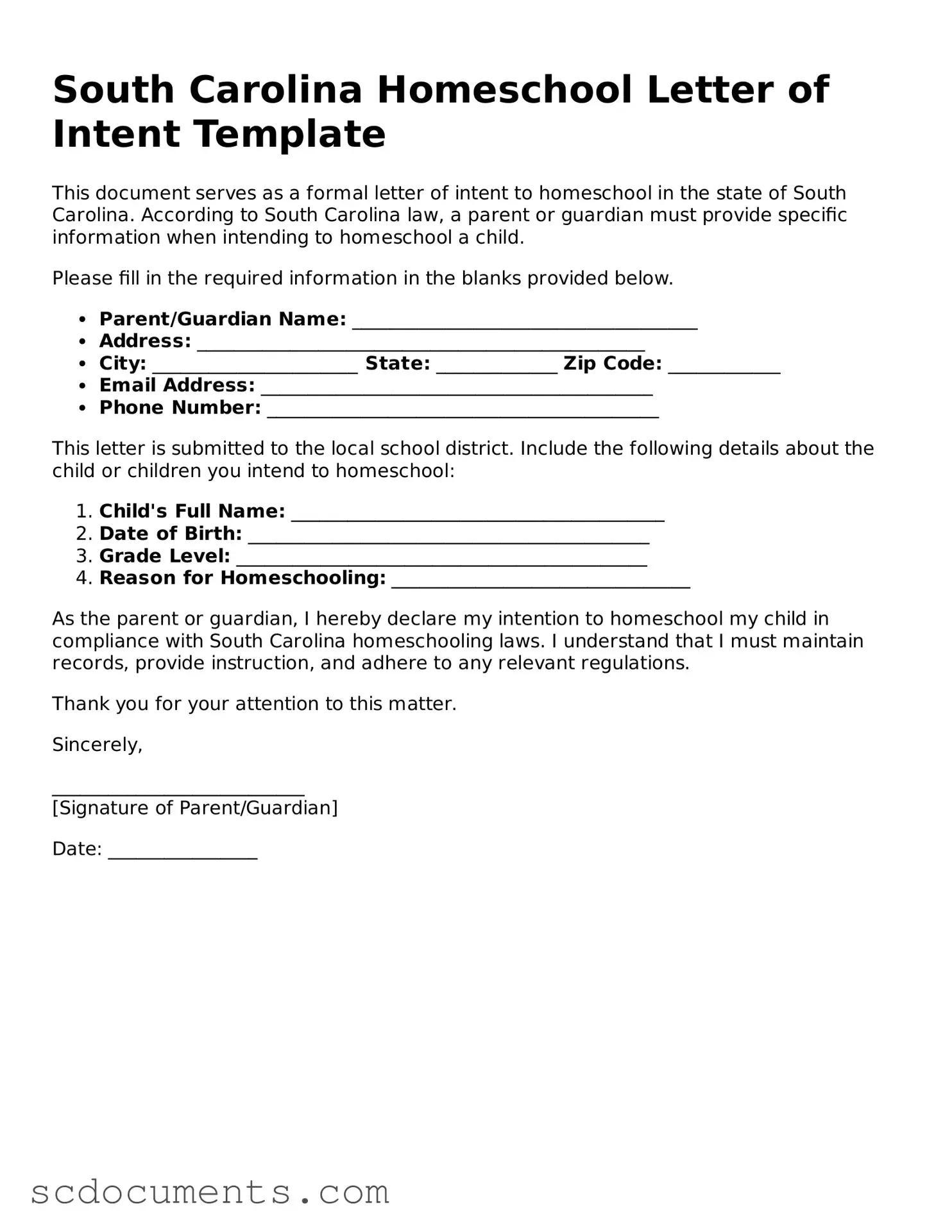Legal South Carolina Homeschool Letter of Intent Form
Dos and Don'ts
When filling out the South Carolina Homeschool Letter of Intent form, it is important to follow certain guidelines to ensure that your submission is complete and accurate. Here are seven things you should and shouldn't do:
- Do provide accurate information about your child, including their full name and date of birth.
- Do include your contact information, such as your address and phone number.
- Do specify the educational program you plan to follow for your homeschool curriculum.
- Do submit the form by the deadline to avoid any complications with your homeschooling status.
- Don't leave any sections of the form blank; ensure all required fields are filled out.
- Don't forget to sign and date the form before submitting it.
- Don't use unclear or vague language; be as specific as possible in your descriptions.
File Data
| Fact Name | Details |
|---|---|
| Purpose | The South Carolina Homeschool Letter of Intent form is used to officially notify the state of a family's intention to homeschool their child. |
| Governing Law | This form is governed by the South Carolina Code of Laws, Section 59-65-40. |
| Submission Deadline | The Letter of Intent must be submitted within 30 days of beginning homeschooling. |
| Required Information | Families must provide basic information, including the child's name, age, and the address of the homeschooling location. |
| Annual Renewal | Once submitted, the Letter of Intent does not require annual renewal unless there are changes in the homeschooling status. |
| Record Keeping | It is important for families to keep a copy of the Letter of Intent for their records as proof of notification. |
Documents used along the form
When families choose to homeschool in South Carolina, they often need to complete various forms and documents in addition to the Homeschool Letter of Intent. These documents help ensure compliance with state regulations and provide a clear framework for the homeschooling process. Below is a list of commonly used forms and documents.
- Attendance Records: These documents track the days and hours a student engages in educational activities. Maintaining accurate attendance records is essential for accountability.
- Curriculum Plan: A detailed outline of the educational materials and subjects to be covered throughout the year. This plan helps parents organize their teaching strategies and ensures a comprehensive education.
- Progress Reports: Regular assessments of a student’s academic progress. These reports can be shared with educational authorities if required and help parents evaluate their child’s learning effectively.
- Standardized Test Results: Many homeschooling families choose to administer standardized tests to gauge their child's academic performance. These results can provide insight into areas that may need additional focus.
- Portfolio of Student Work: A collection of a student’s work, including assignments, projects, and assessments. This portfolio serves as evidence of learning and can be reviewed by educational authorities if necessary.
- Educational Philosophy Statement: A document outlining the family's approach to education. This statement can clarify the educational goals and values that guide the homeschooling process.
- Hold Harmless Agreement: To protect yourself from liability, consider utilizing the practical Hold Harmless Agreement template that outlines responsibilities and safeguards during specific events.
- Notification of Withdrawal: If a child is transitioning from public or private school to homeschooling, a notification of withdrawal may be required to officially inform the previous school.
- Extracurricular Activity Permission Forms: These forms may be needed if students wish to participate in activities outside of their homeschooling environment, such as sports or clubs organized by local schools.
Understanding and preparing these documents can facilitate a smoother homeschooling experience. Each document plays a role in ensuring compliance with state regulations and enhancing the educational journey for both students and parents.
Key takeaways
When filling out and using the South Carolina Homeschool Letter of Intent form, there are several important points to keep in mind. Here are some key takeaways:
- Complete the Form Accurately: Ensure that all sections of the form are filled out completely and correctly. This includes providing the names and ages of your children.
- Submit on Time: The Letter of Intent must be submitted to the local school district by the required deadline. Late submissions may lead to complications.
- Keep Copies: Always keep a copy of the submitted Letter of Intent for your records. This can be useful for future reference or if any questions arise.
- Stay Informed: Familiarize yourself with South Carolina's homeschooling laws and requirements. This knowledge will help ensure compliance and a smooth homeschooling experience.
Other South Carolina Templates
How to Set Up an Operating Agreement for Llc - This agreement provides a framework for operational procedures.
The completion of the MO-941 form is crucial for employers to ensure proper reporting of income taxes withheld in Missouri. By accurately filling out this form, employers can address any changes in their business information, including adjustments to withholding amounts and compensation deductions. To aid with this process, it is beneficial to access All Missouri Forms, which provides additional resources and guidance on submitting the necessary documentation properly and on time.
General Power of Attorney Form South Carolina - Ensures that someone's wishes are carried out even if they cannot express them.
